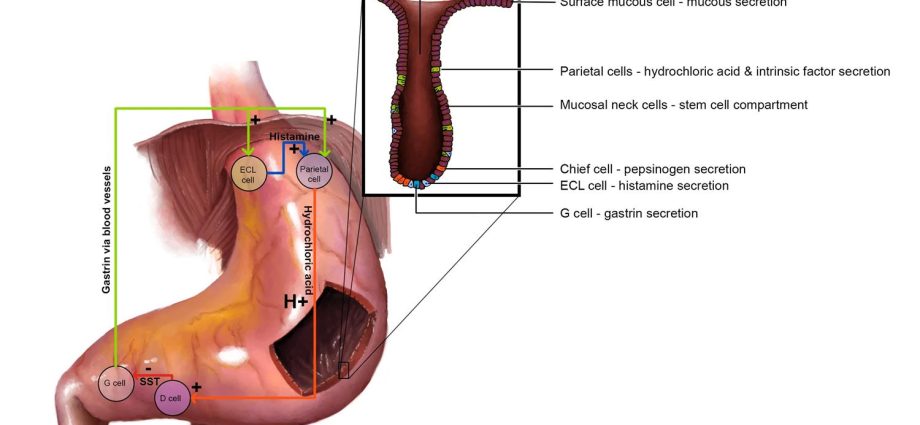Contents
Helicid is a drug used in family medicine and gastroenterology. It affects the work of the digestive tract, inhibiting the secretion of gastric juice. Helicid is taken i.a. in the symptoms of reflux and ulceration.
Helicid 10, -20, -Forte, Producer: Zentiva
| form, dose, packaging | availability category | the active substance |
| capsules; 10 mg, 20 mg, 40 mg; 14 pieces, 28 pieces, 90 pieces | prescription drug | omeprazole |
Indications for the use of the drug Helicid
Helicid is a drug available in the form of capsules – only by prescription. The active substance of the preparation is omeprazole, which reduces the acidity of gastric juice and has a bactericidal effect. Helicid is used to treat duodenal ulcer, gastric ulcer, gastric and duodenal ulcers caused by the use of non-steroidal anti-inflammatory drugs (NSAIDs), reflux oesophagitis, symptomatic gastroesophageal reflux disease, Zollinger-Ellison syndrome.
Helicid is also used as a preventive measure against duodenal ulcer, gastric ulcer, and gastric and duodenal ulcers associated with NSAID treatment in patients at risk of developing them.
Dosage of the drug Helicid
Adults:
- Treatment of duodenal ulcer: 20 mg once daily for 2-4 weeks. In patients with poorly responsive duodenal ulcer 40 mg once daily for 4 weeks.
- To stop the duodenal ulcer from coming back: usually 20 mg once a day; in some patients a dose of 10 mg once daily is sufficient. If necessary, your doctor may increase the dose to 40 mg once a day.
- Treatment of gastric ulcer: 20 mg once daily for 4-8 weeks. In patients with poorly responsive gastric ulcer 40 mg once a day for 8 weeks.
- To stop your stomach ulcers from coming back: The usual dose is 20 mg once a day. If necessary, your doctor may increase the dose to 40 mg once a day.
- Eradication H. pylori in people with peptic ulcer: 20 mg twice a day or 40 mg once a day in combination with prescribed antibiotics, depending on the treatment regimen used, for 7 days. Your doctor may recommend repeating the treatment if necessary.
- Treatment of gastric and duodenal ulcers caused by NSAID treatment: 20 mg once daily for 4-8 weeks.
- Prevention of gastric and duodenal ulcers associated with the use of NSAIDs in patients at risk (people over 60 years of age, with peptic ulcer or previous upper gastrointestinal bleeding): 20 mg once a day.
- Treatment of reflux oesophagitis: 20 mg once daily for 4-8 weeks. In patients with severe oesophagitis 40 mg once daily for 8 weeks.
- Long-term maintenance treatment after reflux oesophagitis has resolved: 10 mg once daily; if necessary, your doctor will increase the dose to 20-40 mg once a day.
- To treat symptomatic gastro-oesophageal reflux disease: 20 mg once daily; in some patients a dose of 10 mg once daily is sufficient. If the symptoms do not improve after 4 weeks of using the preparation, consult a doctor for further diagnosis.
- Zollinger-Ellison syndrome: initially usually 60 mg daily, maintenance dose 20-120 mg daily. If doses are higher than 80 mg per day, they should be taken in 2 divided doses. The duration of the treatment will be determined by your doctor.
Children over 1 year of age weighing more than 10 kg:
- For the treatment of reflux oesophagitis and symptomatic treatment of heartburn and acid regurgitation in gastro-oesophageal reflux disease:
In children after 1 year of age and weighing 10-20 kg, 10 mg once a day is used; if necessary, the doctor may increase the dose to 1 mg once a day.
In children over 2 years of age and weighing more than 20 kg, 20 mg once a day is used; if necessary, the doctor may increase the dose to 1 mg once a day.
Children after the age of 4:
- Treatment of duodenal ulcer caused by infection H. pylori, in combination with the prescribed antibiotics, depending on the treatment schedule: body weight 15-30 kg: 10 mg twice a day; body weight greater than 2 kg: 30 mg twice a day. Treatment lasts for 20 days, sometimes 2 days, in combination with antibiotics.
There is no need to adjust the dose in the elderly or those with renal impairment. In people with hepatic impairment, 10–20 mg daily.
Taking Helicid:
Helicid in the form of capsules is intended for oral use. Capsules should be taken in the morning, avoid taking with food. The capsules should be swallowed whole (not chewed, chewed or crushed) with half a glass of water. For ease of swallowing, you can also open the capsule and swallow its contents with half a glass of water, or mixed with water or a slightly acidic drink (e.g. fruit juice or apple sauce); The suspension should be prepared immediately before taking, after taking it with half a glass of water. The capsule can also be sucked and then swallowed (without chewing) with water.
Helicid and contraindications
A contraindication to the use of Helicid is hypersensitivity to any of the ingredients or to other drugs derived from benzimidazole, parallel to nelfinavir (antiviral drug).










